The Best Natural Insecticides to Help Save Your Garden
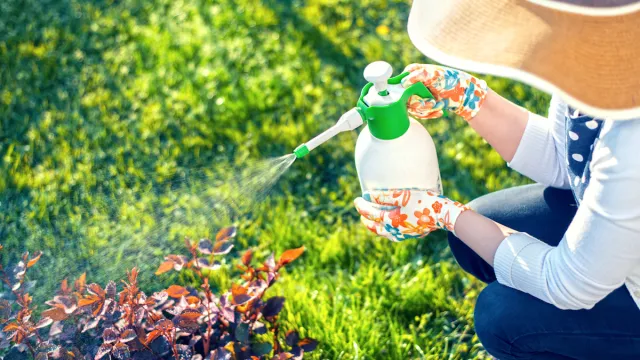
Nothing ruins a gardener or homeowner’s day quite like noticing an infestation of pests, whether it’s aphids on a rose bush, ants in a kitchen corner, or slugs in a patch of lettuce. If you’re interested in non-toxic alternatives to harsh chemicals, you may turn to natural insecticides. These formulas clear up issues in similar ways as more heavy pesticides (in fact, many of their ingredients are even used in those products!) but are typically safer and easier on the environment. Keep reading to learn more about the best DIY alternatives and experts’ advice on using them most effectively.
RELATED: Bug Spray May Cause Infertility and Birth Defects, New Study Shows.
What Are the Advantages of Homemade Pesticides?
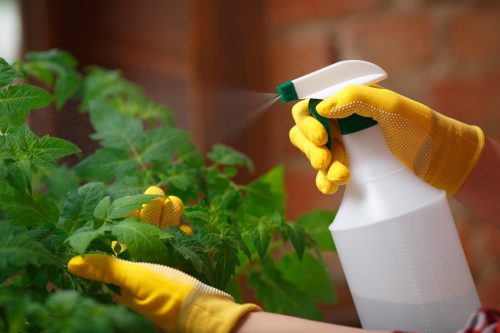
There are many reasons home gardeners and pest control companies may favor homemade pesticides for plants.
“Choosing a natural way to deal with garden pests is like picking a gardening style that cares about keeping things balanced in nature,” says Michel Johnson, entomologist and founder of Ciao Bed Bugs. “They’re good for the environment and break down without causing harm. Plus, they help keep helpful bugs, like pollinators, around—the secret heroes that keep your garden in harmony.”
Natural solutions are also great if you have a yard where kids and pets like to play. While traditional pesticides can be toxic, harmful, or irritating when ingested, inhaled, or touched, natural ones have minimal risk—they might smell funky or taste bad, but most won’t cause trouble.
Of course, pesticide toxicity applies to adults, too, especially those who spend a lot of time applying them or inhaling them while doing other gardening tasks.
Finally, using a natural insecticide ensures you don’t unintentionally harm a nearby plant. According to the University of California Agriculture & Natural Resource, “Pesticides can seriously damage some plants.” If you’re using something harsh, you’ll want to read the label to ensure you don’t injure a plant or use a product near a plant that could be intolerant.
RELATED: 6 Ways to Pest-Proof Your Grass, According to Landscaping Experts.
10 Natural Insecticides to Try at Home
Natural pesticides are often safe, but before using one on an entire plant, it’s smart to do a spot test to check that the plant reacts well to your solution. Some plants could be intolerant to certain ingredients, and you’re better off harming one leaf as opposed to an entire plant.
1. Dish Soap Spray

A mild liquid soap works best against soft-bodied insects like aphids, spider mites, and whiteflies.
“The mechanism behind its prowess lies in the disruption of insect cell membranes, instigating dehydration and eventual death,” says Johnson. It’s also budget-friendly since your only expense is liquid dish soap or something like castile soap, which you should be able to find for between $2 and $7.
To make it, mix around one tablespoon of dish soap with one quart of water and add the solution to a spray bottle. (Johnson says it’s better to start milder and work your way to a less diluted solution if the problem doesn’t go away.)
“Spray on affected plants, covering both upper and lower leaf surfaces,” advises Johnson. It’s best to apply early in the morning or late evening to avoid potential sun damage, and you’ll want to reapply around once a week.
2. Vegetable Oil Spray
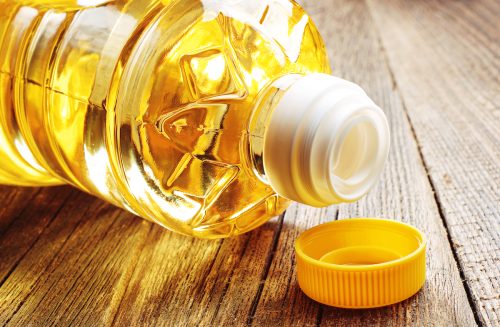
A vegetable spray solution is another great weapon against soft-bodied bugs like aphids and mites. “This concoction creates an emulsion that coats insects, disrupting their respiratory functions,” says Johnson.
The simple recipe includes just three ingredients: a cup of vegetable oil, a tablespoon of mild liquid dish soap, and water; if you don’t have those items as pantry staples already, they’ll run you between $5 and $12.
To use the spray, cover the upper and lower surfaces of each leaf, either in the early morning or late evening, as the oil leaves the leaves vulnerable to sun damage, especially if the plant is in direct sunlight. Start by applying the solution once a week, though you may want to spritz more frequently depending on the severity of the infestation.
“Tailoring your application to the unique needs of each plant and the specific pest landscape brings optimal and sustainable results,” says Johnson.
3. Neem Oil Spray
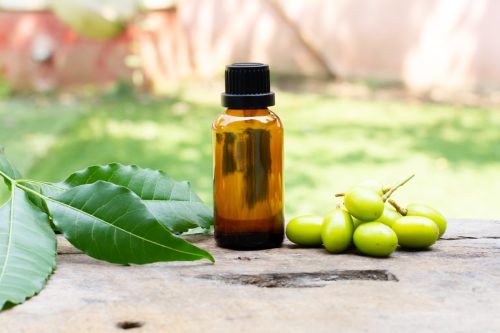
Neem oil comes from the neem tree and can be used to eliminate bugs like aphids, beetles, fruit flies, whiteflies, and mites. It’s been used as a natural pesticide for centuries, but these days, there are lots of commercially available options in the sub-$10 range.
Either buy a pre-blended version or mix about 1.5 teaspoons of pure neem oil and a teaspoon of dish soap with a quart of water. Spritz onto all parts of the plant about once a week in the morning or evening. It works by coating bugs so they suffocate and reducing their desire to eat, leading to starvation.
4. Chili Pepper Spray

According to Shannon Harlow-Ellis, technical specialist at Mosquito Joe, chili pepper spray deters pests due to its capsaicin content, which irritates their mouths and skin. It’s effective at keeping mammals like chipmunks, squirrels, and even deer at bay, deterring bugs like aphids and ants, and killing bugs like spider mites.
For the recipe, finely chop a handful of hot peppers and mix them into a quart of water (you can also use a blender or food processor here). If you want to add an extra boost, include a few drops of liquid dish soap to help the mix stick to the plants—in total, it should only cost about $5.
Spray each leaf top and bottom with the solution in the evening or mid-morning and reapply every three to four days or after heavy rainfall.
5. Garlic Spray
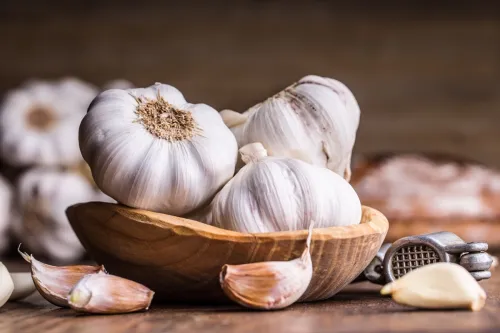
A chili pepper and garlic spray can also be effective against aphids—and even if you don’t have those ingredients on hand, it shouldn’t cost more than $6 to make.
Nathan Heinrich, a horticulturist and botanical designer, suggests boiling 10 to 15 hot peppers of any variety in a gallon of water with 10 to 12 cloves of chopped garlic. Then, allow the mixture to rest for 24 hours. “Strain the liquid into a sealable gallon container and add two to three tablespoons of olive oil to help the liquid stick to the leaves and stems of the plants you are treating,” he says, adding that dish soap also works in place of olive oil.
Apply to all parts of the plant in the morning or evening every three to four days or until the insects are gone.
Similar to the straight chili pepper mix, it nixes aphids and other insects and prevents squirrels, chipmunks, deer, rabbits, and raccoons from eating your plants and vegetables. Just make sure you wash any edible plants thoroughly before eating!
6. Rosemary Oil Spray
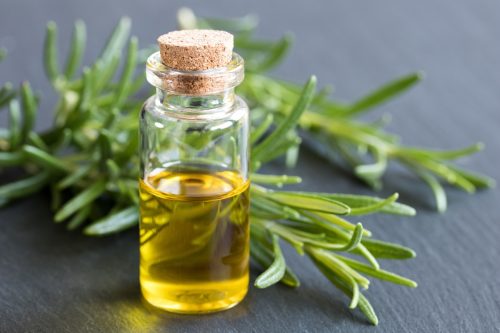
A rosemary oil solution is another of Heinrich’s favorite strategies to eliminate pests naturally. “It works in three separate ways,” he says. It paralyzes insects by disrupting their nervous systems, blocks the insect’s ability to breathe, and deters insects with intense fragrance.
“Rosemary oil is highly effective in killing spider mites, moths, gnats, white flies, scale, and aphids,” he says. Heinrich likes commercial products, like Earth’s Ally Insect Control ($10 on Amazon). You can also fill a spray bottle with water and add a few drops of rosemary oil, which typically retails for less than $10 per bottle. Spritz it onto all parts of the plant as needed.
7. Diatomaceous Earth
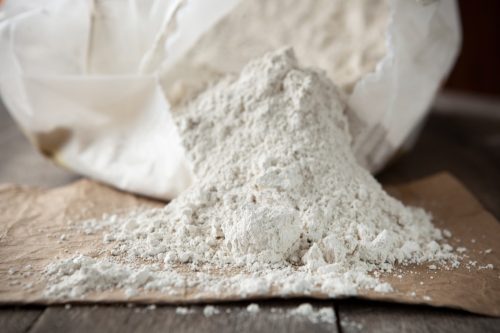
Diatomaceous earth is a soft sedimentary rock created by algae dust. The variety used for pest control comes in powder form and typically costs around $15 for a four-pound bag. It’s especially good at killing insects with exoskeletons, like roaches and ants, according to Insider, and works by dehydrating the insects and their habitats, either killing them or making it difficult for them to live.
Experts suggest using a duster with a nozzle to apply the powder near the base of plants and to block the tunnels that insects use to navigate in and out of your home. If you use diatomaceous earth outside, reapply it after rain.
8. Pyrethrins Spray
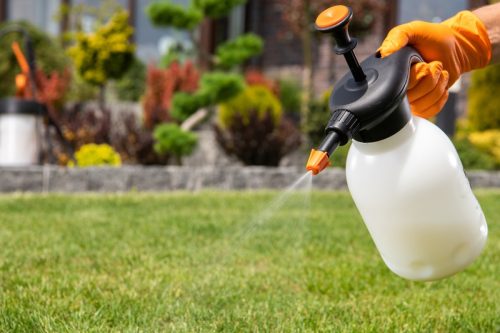
This is an organic pesticide that comes from the chrysanthemum cinerarifolium flower and can be used to control mosquitos, flies, mites, some beetles, and whiteflies, according to Arbico Organics.
There are many commercial options available for less than $10, and most are preferable to making a DIY spray, which requires an intensive process of soaking dried flowers for a long period of time. Spray it directly onto a plant or infestation.
9. Beer Spray Trap

Great news: You can use a leftover pint to create a natural insecticide that’s effective against slugs and snails.
“Here’s the idea: The yeast in the beer emits a tempting scent, like a fragrant invitation, luring slugs and snails to a watery end,” says Johnson.
To create the trap, cut two-inch-wide square holes into a plastic container, like a soda bottle. The holes should be about 1.5 inches from the bottom of the bottle, and the flaps of plastic used to cut the squares should point toward the bottom of it. Fill the base of the bottle (below the squares) with beer and place the bottle into the soil. Slugs will climb the plastic flaps into the trap, then fall into the beer and drown.
You’ll want to change the beer every few days. All told, this trap shouldn’t cost more than a dollar or two a week.
10. Vinegar Spray
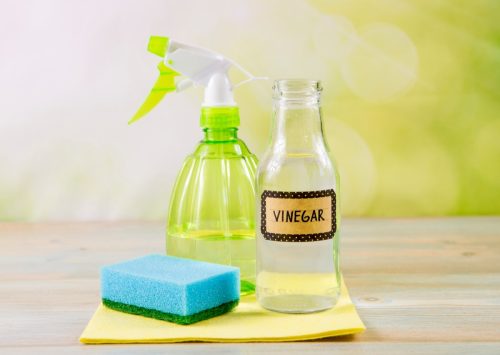
A vinegar spray works as a great natural insecticide both in the garden and the home, killing off pests like mosquitos and spiders and making it difficult for ants to follow their usual paths.
“Thanks to vinegar’s strong smell, it becomes a guard, keeping certain bugs away with its pungent scent,” says Johnson.
To make it, mix 1.5 cups of white vinegar with a quart of water. Spritz it around your entry points to keep bugs at a distance, or spray the bugs directly. You can spray plants directly, but make sure to spot-test first since some plants don’t agree with vinegar’s acidity. Reapply as needed—if you’re not spraying a plant directly, you could even use this mixture multiple times a day for about $1 per spray bottle.
RELATED: 4 Soaps and Scents That Repel Mosquitoes, Experts Say.
Additional Methods
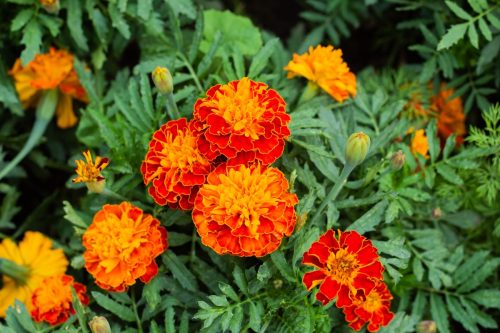
In addition to using a pesticide for plants, you could also try companion planting. That’s when you plant certain plants with pest-fighting properties next to other ones whose defenses might be weaker.
For example, when you plant cucumbers next to corn, the cucumbers deter raccoons from the corn, while the corn prevents cucumbers from wilting, according to The Free Range Life. Additionally, planting marigolds anywhere can help prevent aphid infestations. You’ll need to research which plants combat the specific pest problem you’re having in your yard.
Conclusion
There are many ways to prevent and halt pest infestations without resorting to harsh chemicals. Certain homemade solutions can be employed to combat specific pests, as can commercially available formulations that use similar natural ingredients. These options are better for the environment and are non-toxic, which makes them great for areas that kids, pets, and even adults frequent.
For more gardening-related information, visit Best Life again soon.
For more home and garden advice delivered straight to your inbox, sign up for our daily newsletter.